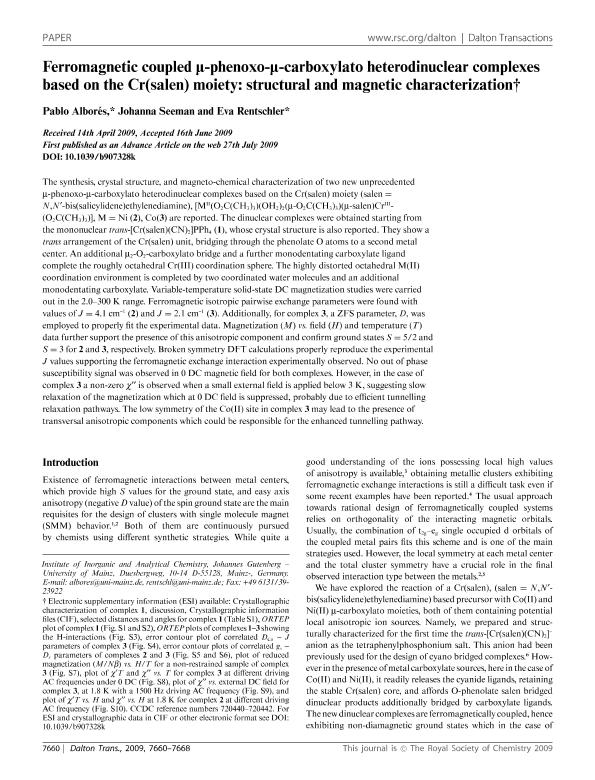Mostrar el registro sencillo del ítem
dc.contributor.author
Alborés, Pablo

dc.contributor.author
Seeman, Johanna
dc.contributor.author
Rentschler, Eva
dc.date.available
2019-04-23T19:16:59Z
dc.date.issued
2009-09
dc.identifier.citation
Alborés, Pablo; Seeman, Johanna; Rentschler, Eva; Ferromagnetic coupled μ-phenoxo-μ-carboxylato heterodinuclear complexes based on the Cr(salen) moiety: Structural and magnetic characterization; Royal Society of Chemistry; Dalton Transactions; 37; 9-2009; 7660-7668
dc.identifier.issn
0300-9246
dc.identifier.uri
http://hdl.handle.net/11336/74835
dc.description.abstract
The synthesis, crystal structure, and magneto-chemical characterization of two new unprecedented μ-phenoxo-μ-carboxylato heterodinuclear complexes based on the Cr(salen) moiety (salen = N,N′-bis(salicylidene)ethylenediamine), [MII(O2C(CH3)3)(OH2)2(μ-O2C(CH3)3)(μ-salen)CrIII(O2C(CH3)3)], M = Ni (2), Co(3) are reported. The dinuclear complexes were obtained starting from the mononuclear trans-[Cr(salen)(CN)2]PPh4 (1), whose crystal structure is also reported. They show a trans arrangement of the Cr(salen) unit, bridging through the phenolate O atoms to a second metal center. An additional μ2-O2-carboxylato bridge and a further monodentating carboxylate ligand complete the roughly octahedral Cr(III) coordination sphere. The highly distorted octahedral M(II) coordination environment is completed by two coordinated water molecules and an additional monodentating carboxylate. Variable-temperature solid-state DC magnetization studies were carried out in the 2.0–300 K range. Ferromagnetic isotropic pairwise exchange parameters were found with values of J = 4.1 cm−1 (2) and J = 2.1 cm−1 (3). Additionally, for complex 3, a ZFS parameter, D, was employed to properly fit the experimental data. Magnetization (M) vs. field (H) and temperature (T) data further support the presence of this anisotropic component and confirm ground states S = 5/2 and S = 3 for 2 and 3, respectively. Broken symmetry DFT calculations properly reproduce the experimental J values supporting the ferromagnetic exchange interaction experimentally observed. No out of phase susceptibility signal was observed in 0 DC magnetic field for both complexes. However, in the case of complex 3 a non-zero χ″ is observed when a small external field is applied below 3 K, suggesting slow relaxation of the magnetization which at 0 DC field is suppressed, probably due to efficient tunnelling relaxation pathways. The low symmetry of the Co(II) site in complex 3 may lead to the presence of transversal anisotropic components which could be responsible for the enhanced tunnelling pathway.
dc.format
application/pdf
dc.language.iso
eng
dc.publisher
Royal Society of Chemistry

dc.rights
info:eu-repo/semantics/openAccess
dc.rights.uri
https://creativecommons.org/licenses/by-nc-sa/2.5/ar/
dc.subject
Single-Molecule Magnets
dc.subject
Cobalt(Ii) Complexes
dc.subject
Pivalate Complexes
dc.subject
Anisotropy
dc.subject.classification
Otras Ciencias Químicas

dc.subject.classification
Ciencias Químicas

dc.subject.classification
CIENCIAS NATURALES Y EXACTAS

dc.title
Ferromagnetic coupled μ-phenoxo-μ-carboxylato heterodinuclear complexes based on the Cr(salen) moiety: Structural and magnetic characterization
dc.type
info:eu-repo/semantics/article
dc.type
info:ar-repo/semantics/artículo
dc.type
info:eu-repo/semantics/publishedVersion
dc.date.updated
2019-03-27T17:53:37Z
dc.journal.number
37
dc.journal.pagination
7660-7668
dc.journal.pais
Reino Unido

dc.description.fil
Fil: Alborés, Pablo. Johannes Gutenberg Universitat Mainz; Alemania. Consejo Nacional de Investigaciones Científicas y Técnicas; Argentina
dc.description.fil
Fil: Seeman, Johanna. Johannes Gutenberg Universitat Mainz; Alemania
dc.description.fil
Fil: Rentschler, Eva. Johannes Gutenberg Universitat Mainz; Alemania
dc.journal.title
Dalton Transactions

dc.relation.alternativeid
info:eu-repo/semantics/altIdentifier/doi/http://dx.doi.org/10.1039/b907328k
dc.relation.alternativeid
info:eu-repo/semantics/altIdentifier/url/https://pubs.rsc.org/en/Content/ArticleLanding/2009/DT/b907328k
Archivos asociados
